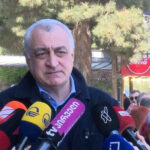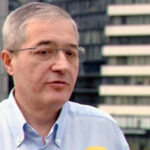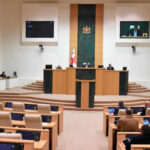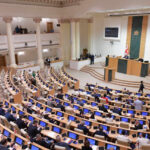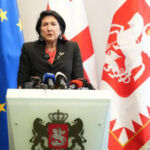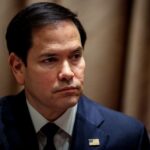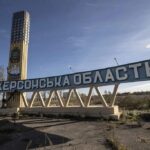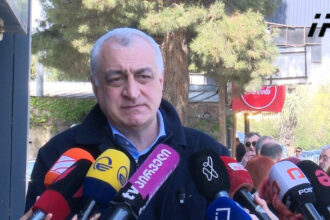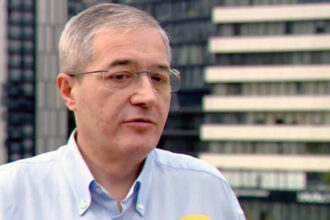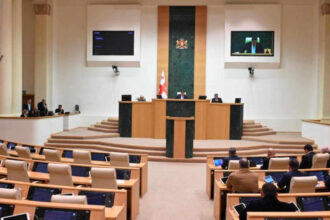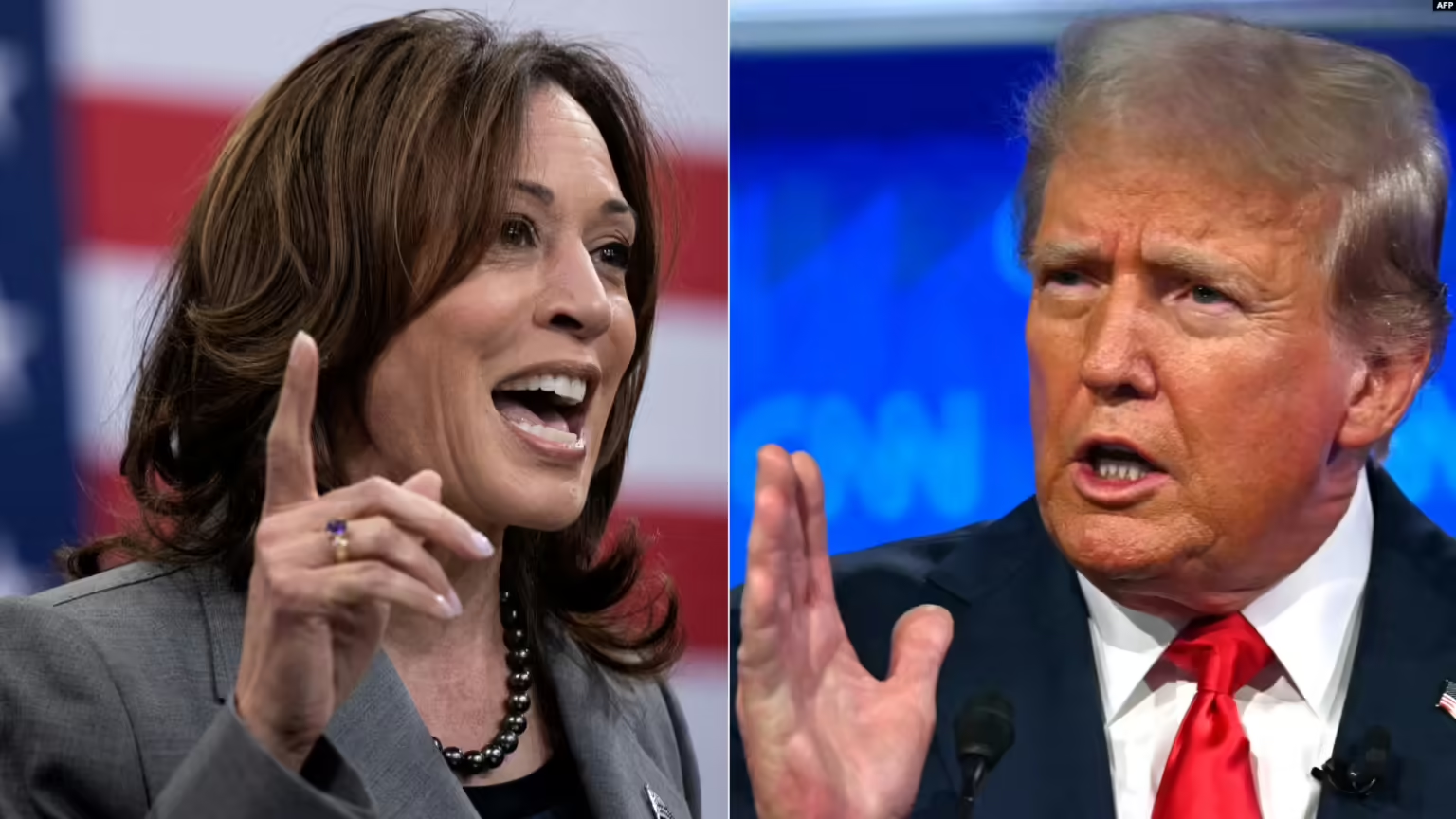Ukraine is watching with bated breathe as millions of Americans vote in the race between Democrat Kamala Harria and Republican Donald Trump.
Both candidates are now neck-and-neck at around 48% in similar voter groups. Democratic Vice President Harris holds a slight advantage in the polls. The final outcome, along with the future US support for Ukraine, is still far from certain.
By July 2024, the US will have provided Ukraine with EUR98.4 Billion in aid since the beginning of the full-scale invasion. US military assistance has been crucial, with nearly 52% of the total international defense aid given to Ukraine since invasion began.
The country’s lifeline is now on the brink, as its key ally will soon decide who will replace Biden in the Oval Office.
Same promise, colliding agendas
Ukraine is still a major issue for both Democratic and Republican candidates, even though their differences are centered on domestic issues such as immigration and abortion.
Ukraine is also one of the biggest challenges that the next president inherits from the Biden Administration. Since late 2023, securing crucial aid for Ukraine has grown increasingly difficult. Republicans have blocked a $60 billion package of aid for months, signaling growing fatigue with the Russian invasion.
Both candidates have promised to end the war in Ukraine, but their strategies to achieve the much-desired peace could not be more different.
Democrat Harris has pledged to continue the current administration’s support of Ukraine “for as much time as it takes”, and to intensify sanctions against Russia, which she actively shaped during this term as Vice President.
Harris has built her political agenda for Ukraine on a rejection of ceding any territory to Russia in exchange for peace. She has called this “surrender” proposal.
Harris has also backed the US leadership in NATO, and Ukraine’s future inclusion into the alliance. However, she has not specified a timeframe or conditions for an possible accession.
Jeffrey Stacey, former senior advisor at the State Department, said that Kamala Harris “firmly supports Ukraine”. “This is good for Ukraine, Russia, our alliances and all directions.”
Trump’s isolationist approach, on the other hand, aims to bring an end to the conflict “very quickly”, although he dodges questions about whether he supports the victory of Ukraine, fueling speculations about his willingness for peace negotiations that favor Russia.
Trump’s campaign, which includes his criticism of the massive financial and military assistance flowing to Ukraine, and his call for Europe to shoulder a greater burden, heightens Kyiv’s fears that, if elected, Trump could pressure Ukraine to cede Russian-occupied territory to the Kremlin.
J.D.Vance – Trump’s vice-presidential nominee – echoes the message, speculating that Trump’s plan for resolving the war in Ukraine could include creating a ‘demilitarized area’ in Russian-occupied territories.
Alarms sound in Zelenskyy’s office
The Financial Times reported on 28 October that Trump’s plan was to freeze the Ukraine conflict along the existing lines of fire, and create autonomous areas within a demilitarized area, citing sources near the ex-president.
The plan also places responsibility for the implementation of peace on Europe, while keeping Ukraine out from NATO.
According to Trump’s ex-aides, Trump believes derailment of Ukraine’s NATO membership could be the key for bringing Russia to the negotiation table, turning Trump’s promise to end the “war within 24 hours” into reality.
The prospect of US pressure on freezing the war raised alarms in Zelenskyy’s office. Both the public statements and newly unveiled “victory plan” firmly reject any concessions based within the internationally recognized borders of 1991.
Oleksandr Merezhko, the chair of Ukraine’s foreign affairs committee in parliament, dismissed Trump’s possible plan on 29 October. He called it “unrealistic”, citing fundamental problems with Russian reliability.
“This plan does not look realistic because it implies that Putin will agree, who is unreliable and untrustworthy when it comes to respecting any agreements,” Merezhko said to the Kyiv Independent.
According to the lawmaker’s plan, it aims to breathe life into the failed Minsk Agreements of 2014-2015 by adding enforcement mechanisms and deploying European troops as peacekeepers.
Merezhko represents President Zelenskyy’s Servant of the People Party. He counters that Putin “still believes he will win” and shows no interest to negotiate. He supports Zelenskyy’s victory plan and insists that the “only solution” is to “strengthen Ukraine, forcing Putin to the negotiation table.”
Between Hope and Fear
Ukrainian officials are on high alert as the election day approaches. They know that no matter which candidate wins, there will be uncertainty about the future support of the US.
Yaroslav Zelezniak, first deputy chairman of the Ukrainian Parliamentary Committee on Finance, Tax, and Customs Policy, said: “Nobody knows what will happen after either candidate has been elected.”
Zhelezniak cites the widespread concern among Ukraine’s top officials that US support of Ukraine — both financially and militarily — may not be the priority for either candidate at the White House.
He says that the only way to win is for President Biden to take decisive action on NATO membership before his term ends and Harris’s inauguration takes place on 20 January.
“Regardless of the winner, there is a good chance for Ukraine to remain unchanged for at least one year,” Zhelezniak said to Euromaidan Press.
Ukraine’s room to maneuver
Experts believe that each candidate could offer unique opportunities for Ukraine, but not always as one might expect.
In the ongoing presidential race, both candidates’ bids reflect their party lines. They cater more to their supporters than they do to their personal convictions and actionable plans regarding Ukraine policy.
Kamala Harris has a quick entry into the race, which has made her strategy heavily dependent on appealing to Biden voters. Trump’s stance is primarily resonant with conservatives in the Republican Party.
This opens the possibility that candidates, once in office, may align their policies to the influence of Congress and the need for them to rally support from groups other than those they targeted before the election.
Both candidates’ backgrounds could also diverge their actual foreign policies from their election promises, presenting Zelenskyy with both challenges as well as opportunities.
While the candidates have different priorities, Ukraine is at the core of a nuanced but strategic US foreign policy goal: countering Russia. Even with Trump’s isolationist rhetoric, this issue will likely be equally important for both candidates.
Euromaidan Press asked for expert opinions to clarify what to expect of each candidate. They also examined the potential benefits and disadvantages of both candidates, as well as factors Ukraine can leverage, regardless of who occupies White House.
Defense boom amid uncertainty
Ihor Chalenko is a Ukrainian political scientist and the head of the Center for Analysis and Strategies, a think tank. He believes that Kyiv, regardless of who wins in the White House, will have the momentum needed to advance US-Ukraine defence manufacturing cooperation.
He cites the interest of American factories in enhancing collaboration with Ukraine’s defence sector and insists that this partnership will remain robust regardless of political changes. The expert believes that the established channels via the Pentagon and State Department, will remain open. This will provide a solid foundation to drive the defence cooperation forward.
Chalenko, however, is cautious about Ukraine’s policies in areas where corporate interests are less dominant, and he points out that neither presidential candidates have laid out a comprehensive vision for the future of relations with Ukraine.
Kamala Harris reiterated her support for Ukraine, and stressed the need to end the conflict and achieve peace as Kyiv sees it. Chalenko sees this as a positive sign for the future of Ukraine.
The democratic candidate has avoided discussing any specific plans for the year 2025. This leaves uncertainty regarding long-term commitments.
Chalenko notes that the Biden and Harris approach is based on a war-of-attrition, until Russia cannot sustain its offensive. This will complicate Ukraine’s defence in the long term. The expert predicts that the US will shift its focus inwards with the upcoming elections and the change of government. This could put Harris’s support for Ukraine until April 2025.
Currently, Ukraine can access $5.5 billion of PDA funding as well as $2.4 billion of USAI funding. The Biden administration also has a $20 billion loan plan, which could be funded by frozen Russian assets. However, it still needs Congress’ approval.
This uncertainty makes it difficult for Ukraine to plan for its urgent needs during wartime, such as preparing for the heating season or maintaining defenses on the front lines.
Chalenko argues the prospect of an isolationist Trump presidency raises even more pressing issues that can have a direct impact on the situation in Ukraine.
The Republican’s harsh language towards Zelenskyy, and their push to stop aid in favor of domestic priority, give a good reason to assume that if he wins, Ukraine will not receive the same financial support it received during the Biden Administration.
Chalenko says that it is more concerning to consider the possibility of Trump tacitly accepting Russian de facto control in certain territories, without formal recognition. This would be a major shift for US policy.
Chalenko says that “in other words, you would consider this territory to be occupied but not use mechanisms to return it.” This scenario seems more plausible to him.
He also believes that both of these potential leaders are likely to delay Ukraine’s NATO aspirations throughout their terms.
Harris could offer a general support to Ukraine’s EuroAtlantic ambitions without making any specific commitments.
Experts predict that Ukraine only has a short window — until the 20th of January — to secure an invitation to NATO under the current administration. If this opportunity is lost, Ukraine could be forced to compromise on the “open door” policy in favor of a “bridge to NATO”.
Forced peace or protracted conflict
Vadym ivchenko, member of Ukraine’s parliament defense committee, believes Trump’s background in business could lead to faster decision-making about Ukraine. Ivchenko believes that if negotiations with Putin are difficult, Trump may increase his support for Ukraine in order to gain leverage over Russia.
“Under Trump’s leadership, Ukraine could transform into something similar to a second Israel with swift decisions on weapon procurement, training programs, as well as the establishment of American manufacturing facilities within Ukrainian border,” he told Euromaidan Press.
Military aid and financial support could decrease. However, this could be partially offset by increased engagement of the private sector — whether it is in trade, training or equipment maintenance.
The expert explained that this scenario is based on a frozen conflict, as active combat would discourage American corporate involvement.
Ivchenko warns that this strategy, which is centered on the interests of corporations, could lean more towards American interests. Ukraine will still benefit from a stronger bilateral relationship.
A Harris presidency, on the other hand, promises to maintain Biden’s “hold and grow” strategy, while adopting a more measured, cautious approach.
Harris would likely take a more positive stance on NATO than Trump, who prioritizes US-China relationships over NATO. The expert, however, said that her careful approach to the NATO policy could leave Ukraine in an extended war for years and hinder its ability reclaim occupied territories.
Ivchenko dismisses the possibility that Kyiv will receive a NATO initiation by 20 January.
“During the transition, the unwritten agreements among parties prevent the outgoing government from making major policy decision, leaving such matters to the incoming president’s team.”
Experts warn that Ukraine will be in for a turbulent year 2025 as domestic issues in the US will dominate the news, especially if the results of the elections trigger legal battles. This internal focus combined with uncertain funding prospects could worsen Ukraine’s situation.
Ivchenko is of the opinion that, in this case for Ukraine, the fundamental question is whether to accept gradual attrition or seek a quick solution. Reduced US aid always means territorial losses, either through immediate negotiations or gradual attrition.
On the other side, increased support that could boost morale and allow military pushback seems increasingly out-of-reach.
In this case, it seems that the choice is between negotiating with a Trump administration or facing a war under Harris where some aid could persist at a high price, such as more lives lost.
Ivchenko is of the opinion that Ukraine should use its momentum to achieve its steadfast goal: victory over Russia. Zelenskyy’s office defines this as not only Russia’s military defeat, but also eroding the Kremlin’s global influence and pressing the Kremlin into making significant concessions to Kyiv as well as the wider Euro-Atlantic Community.
Both are not perfect but both are workable
Liam Anderson, a political scientist and lecturer from Wright State University in Ohio, believes that both candidates offer Ukraine opportunities to leverage in various areas.
Experts predict that Democrat Harris will likely continue Biden’s current approach towards Ukraine, which includes providing military aid and arms to Ukraine as well as supporting proxy eroding Russia’s military capabilities.
Experts believe that the policy of Ukraine could be accompanied by significant restrictions.
Despite Harris’ active involvement in supporting Ukraine under Biden – including broad international advocacy, and seven meetings Zelensyy – her professional background may limit her ability fulfill foreign policy commitments.
“Harris’s foreign policy experience is limited — it’s her area of expertise.” Anderson claims that Harris’ background as a California public prosecutor has nothing to do with foreign policy.
In the end, despite Harris’s extensive experience as a vice-president in advocating Ukraine’s interests, Kyiv must be prepared to let domestic issues, such as childcare, take priority on her list.
In any scenario, Harris is likely to maintain Biden’s course in foreign policy and not invest much political capital in Kyiv as the US policymakers are losing interest as the war drags out.
Trump’s close association with the corporate world may bring unexpected investment opportunities through his business interests to Ukraine – but first, he must achieve peace.
Anderson believes that Kyiv can seize this chance to negotiate peace in its own terms if it can tap into Trump’s self-interest, and create a stake for him personally in the outcome.
Even in the best-case scenarios, Trump’s potential presidential election would cause serious complications.
Experts warn that even if Kyiv capitalizes Trump’s leadership style by prioritizing short-term gains over long-term policy effects, his threats to cut NATO member support if they fall short of spending targets should not be taken too lightly.
Even in this case, Trump’s foreign policy is likely to be more influenced by partisan dynamics than his personal preferences.
He warns of the growing Republican opposition within Congress, which calls for repurposing Ukraine aid to American needs. This may be a greater challenge for Kyiv that Trump’s controversial statements.
Zelenskyy could face a difficult task if Trump wins the election with Republicans in control of Congress.
Anderson suggests that, regardless of the outcome of the elections, Ukraine’s future safety may depend more on bilateral agreements similar to US-Japan relations than NATO membership.
He argues that this could be a more effective approach for Kyiv considering that America’s image could be at stake.
The 5 ways Russia is trying influence the 2024 US elections
* Yes, Ukraine will win the war. An ex-minister reveals the winning plan
Kamala Harris must correct Biden’s mistakes on Ukraine
* Trump’s “peace” plan is a blueprint to Russian victory over Ukraine, and the West
* Five reasons why the West should support Ukraine’s victory and not just its survival
Read More @ euromaidanpress.com
